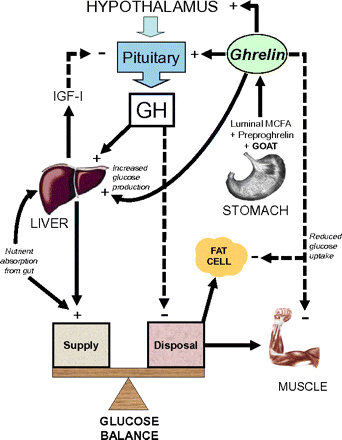AlphaCog
Member
- Joined
- Jan 28, 2014
- Messages
- 98
Growth hormone therapy does not increase, and even seems to lower the risk of cancer. This is evident from a meta-study published by Chinese endocrinologists at Zhejiang University College of Medicine in the Open Journal of Endocrine and Metabolic Diseases.
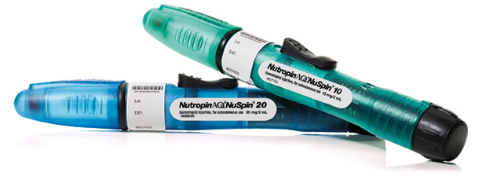
Study
The researchers tracked 10 previously published studies that followed adults receiving growth hormone for several years. The subjects were diagnosed with adult growth hormone deficiency. So the studies may not say much about pharmacological athletes using growth hormone.
In the table below you will find more information about the studies used. Click on it for a larger version.
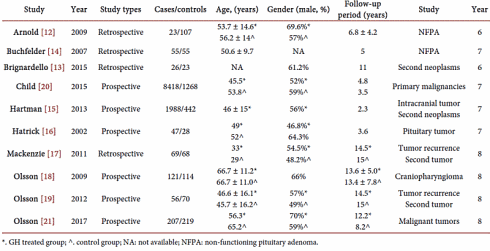
Results
In the studies, the subjects who received growth hormone did not develop cancer more often than the subjects in the control groups. Growth hormone even reduced the risk of cancer.
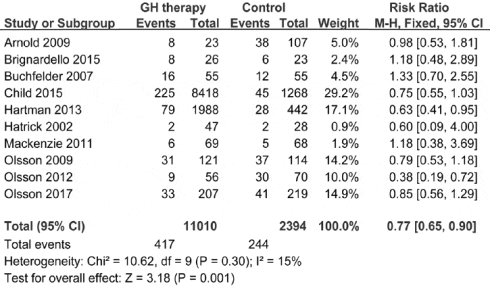
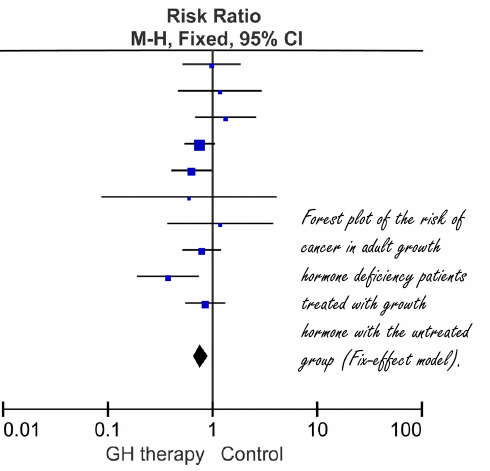
The researchers found evidence of bias. This means that it seems that studies with less attractive results have not been published. However, the bias appeared to be modest, and the researchers suspect that the inclusion of the potentially missing studies in their meta-study would not really alter its outcome.
Conclusion
"Our study corroborates evidence from previous studies showing that growth hormone replacement therapy in adult growth hormone deficiency patients would not increase the risk of cancer; instead, it might be even decrease cancer risk", write the researchers.
"The results suggested that growth hormone replacement therapy in adult growth hormone deficiency patients was safe."
Source:
Open Journal of Endocrine and Metabolic Diseases 2017 January;7(9):173-89.

Study
The researchers tracked 10 previously published studies that followed adults receiving growth hormone for several years. The subjects were diagnosed with adult growth hormone deficiency. So the studies may not say much about pharmacological athletes using growth hormone.
In the table below you will find more information about the studies used. Click on it for a larger version.

Results
In the studies, the subjects who received growth hormone did not develop cancer more often than the subjects in the control groups. Growth hormone even reduced the risk of cancer.


The researchers found evidence of bias. This means that it seems that studies with less attractive results have not been published. However, the bias appeared to be modest, and the researchers suspect that the inclusion of the potentially missing studies in their meta-study would not really alter its outcome.
Conclusion
"Our study corroborates evidence from previous studies showing that growth hormone replacement therapy in adult growth hormone deficiency patients would not increase the risk of cancer; instead, it might be even decrease cancer risk", write the researchers.
"The results suggested that growth hormone replacement therapy in adult growth hormone deficiency patients was safe."
Source:
Open Journal of Endocrine and Metabolic Diseases 2017 January;7(9):173-89.
Growth hormone therapy does not increase the risk of cancer
Growth hormone therapy does not increase, and even seems to lower the risk of cancer. This is evident from a meta-study published by Chinese endocrinologists at Zhejiang University College of Medicine in the Open Journal of Endocrine and Metabolic Diseases.
www.ergo-log.com

